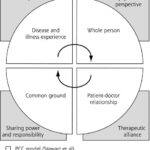The landscape of healthcare is constantly evolving, and within it, the realm of continuing care requires diligent attention to ensure individuals receive the appropriate support. For those navigating the complexities of NHS Continuing Healthcare, the Doh Continuing Care Decision Support Tool stands as a critical resource. This article delves into the significance of this tool, particularly highlighting recent updates and best practices relevant to its application.
The decision support tool is designed to aid in the assessment process for NHS Continuing Healthcare eligibility. It provides a structured framework to evaluate an individual’s needs, ensuring a fair and consistent approach across different regions and care settings. Recent updates to this tool reflect ongoing efforts to refine the assessment process, incorporate legislative changes, and improve clarity for both healthcare professionals and individuals undergoing assessment.
One significant update involves the clarification of legislative references within the framework that underpins the decision support tool. Paragraph 59 of the framework has been revised to explicitly outline the scope of social care provision by local authorities and clearly define the circumstances under which an individual would not be eligible for NHS Continuing Healthcare for nursing or other health services. This distinction is crucial in navigating the often-blurred lines between social care and healthcare responsibilities, ensuring appropriate allocation of resources and support.
.pdf “A document icon representing the National Framework for NHS Continuing Healthcare”)
Further enhancements have focused on practical application and accessibility. Integrated Care Boards (ICBs) have assumed responsibility for NHS Continuing Healthcare from Clinical Commissioning Groups (CCGs) since July 1, 2022. This transition aims to foster more integrated and efficient care pathways. Updates to the national framework and associated tools, including the decision support tool, reflect this organizational shift and emphasize best practices in areas such as hospital discharge procedures and obtaining informed consent. These updates ensure the decision support tool aligns with current healthcare structures and promotes patient-centered care.
To improve user experience, the decision support tool and related documents, such as the NHS continuing healthcare checklist and fast-track pathway tool, have been made available as online fillable forms. This digital accessibility streamlines the assessment process, reducing administrative burden and facilitating easier completion and sharing of information among relevant parties. Moreover, easy-read versions of guidance documents have been introduced to enhance understanding and inclusivity for a wider audience.
Online NHS Continuing Healthcare Tools
It’s also important to note the emphasis on consent and confidentiality within the updated framework and decision support tool. Reflecting common law duties, the guidance underscores the necessity of obtaining explicit consent when using the decision support tool, safeguarding individual privacy and promoting ethical data handling practices.
In conclusion, the doh continuing care decision support tool is a dynamic instrument that undergoes regular updates to remain relevant, accurate, and effective in supporting fair and consistent decision-making in NHS Continuing Healthcare. Staying informed about these updates is crucial for healthcare professionals, legal professionals, and anyone involved in the continuing care process. By understanding the nuances of the tool and adhering to best practices, we can collectively contribute to a more equitable and responsive continuing care system.

